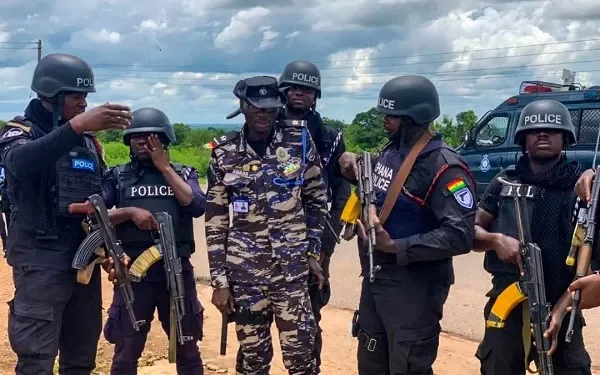As Ghana approaches its 2024 elections, the focus on maintaining public safety and ensuring a peaceful electoral process is paramount. Intelligence-led policing is a proactive way of thinking in law enforcement. It acts as a business process in which agencies implement policies and practices. They focus on developing priorities built on multiple factors, including intelligence analysis. With these priorities in mind, personnel develop intelligence requirements; begin collection based on these requirements; organize, process, and analyze the collected information; and disseminate the completed analytic product to the customer. In recent years, the role of intelligence in policing has become increasingly critical in safeguarding democratic processes worldwide. In Ghana, intelligence-led policing (ILP) will present a strategic approach to enhance public safety during the electoral period.
How Can ILP Effectively Prevent and Manage Potential Security Challenges?
Understanding Intelligence-Led Policing (ILP)
Intelligence-led policing is a modern law enforcement strategy that emphasizes the use of intelligence and data analysis to guide operational decisions. Unlike traditional reactive policing methods, ILP focuses on prevention by identifying and addressing potential threats before they materialize. It involves collecting, analyzing, and disseminating information to anticipate criminal activities, understand patterns of behavior, and deploy resources effectively.
The ILP model is based on collaboration between various stakeholders, including intelligence agencies, law enforcement, the judiciary, and the community. This collaborative approach ensures that information flows seamlessly between entities, allowing for a comprehensive understanding of security threats and enabling proactive measures to counter them. The main goal of ILP is to get ahead of threats and criminal behavior by proactively identifying indicators and acting based upon that knowledge
The Importance of ILP in Ghana’s Election Security
Elections are critical events in any democracy, and they often come with heightened tensions and the potential for security challenges. In Ghana, past elections have witnessed some instances of violence, voter intimidation, and other forms of electoral malpractice. Concerning the foregoing, one can barely point to any previous election in Ghana that had not witnessed some form of violence despite the presence of security personnel. For instance, the 2008 and 2012 elections in Ghana were characterized by some pockets of violence. It must be noted that election violence may not necessarily be physical violence, but may include coercive means such as intimidation, harassment, and threat of violence. These challenges threaten not only public safety but also the integrity of the electoral process. Implementing ILP during the 2024 elections can play a significant role in addressing these issues.
- Preventing Election-Related Violence:
One of the primary concerns during elections is the potential for violence, whether between rival political groups or against voters and electoral officials. ILP can help identify hotspots for potential violence by analyzing historical data, monitoring social media, and gathering intelligence from communities. This information allows law enforcement to deploy resources strategically, increasing police presence in vulnerable areas and conducting pre-emptive operations to prevent outbreaks of violence. - Ensuring the Safety of Electoral Officials and Materials:
Electoral officials and materials, such as ballot boxes and voting machines, are critical to the integrity of the election process. ILP can be used to assess the security risks associated with transporting and storing these materials. By identifying potential threats, such as planned attacks or sabotage, law enforcement can implement protective measures, including secure transportation routes, armed escorts, and surveillance of storage facilities. - Monitoring and Countering Misinformation:
Misinformation and fake news can inflame tensions and provoke unrest during elections. ILP enables the monitoring of online platforms to identify and counter the spread of false information that could incite violence or undermine the electoral process. Intelligence gathered from these platforms can be used to inform the public about the truth, neutralize harmful narratives, and take legal action against those deliberately spreading falsehoods. - Enhancing Voter Confidence and Participation:
A secure electoral environment encourages voter turnout by assuring citizens that they can exercise their right to vote without fear. By preventing violence, safeguarding electoral materials, and countering misinformation, ILP contributes to a safe and orderly election. This, in turn, builds voter confidence and promotes higher participation rates, which are essential for a legitimate and representative outcome.

Challenges and Considerations in Implementing ILP
While the benefits of ILP are clear, its implementation in the context of Ghana’s elections comes with challenges. One of the primary obstacles is the potential for intelligence to be politicized. To avoid this, it is crucial that intelligence operations remain impartial and focused solely on public safety, rather than serving the interests of any political party.
Another challenge is ensuring that intelligence-gathering methods respect citizens’ rights to privacy and freedom of expression. This requires a careful balance between security needs and the protection of civil liberties. Oversight mechanisms and clear legal frameworks are essential to prevent abuses and maintain public trust in law enforcement agencies.
Finally, the effectiveness of ILP depends on the capacity of law enforcement agencies to collect, analyze, and act on intelligence. This requires investment in training, technology, and infrastructure, as well as fostering a culture of information sharing and collaboration among all stakeholders.
Conclusion
As Ghana prepares for the 2024 elections, the adoption of intelligence-led policing offers a proactive approach to maintaining public safety and ensuring a peaceful electoral process. By anticipating and addressing potential security challenges, ILP can help prevent violence, protect electoral officials and materials, counter misinformation, and enhance voter confidence. However, its successful implementation requires a commitment to impartiality, respect for civil liberties, and investment in law enforcement capabilities. With these considerations in mind, ILP can play a pivotal role in safeguarding Ghana’s democratic process and upholding the integrity of its elections.
Works Cited
Ateng, M., Ibrahim, M. & Appiah-Boateng, S. Political violence in Ghana: trends, triggers and intervention strategies. SN Soc Sci 4, 71 (2024). https://doi.org/10.1007/s43545-024-00874-0
Bitafir Ijon, Frank. 2020. “Election Security and Violence in Ghana: The Case of Ayawaso West Wougon and Talensi By-Elections”. Asian Research Journal of Arts & Social Sciences 10 (1):32-46. https://doi.org/10.9734/arjass/2020/v10i130139.https://leb.fbi.gov/articles/featured-articles/intelligence-led-policing-for-law-enforcement-managers






























